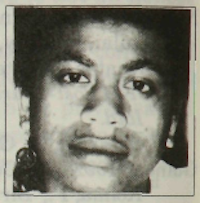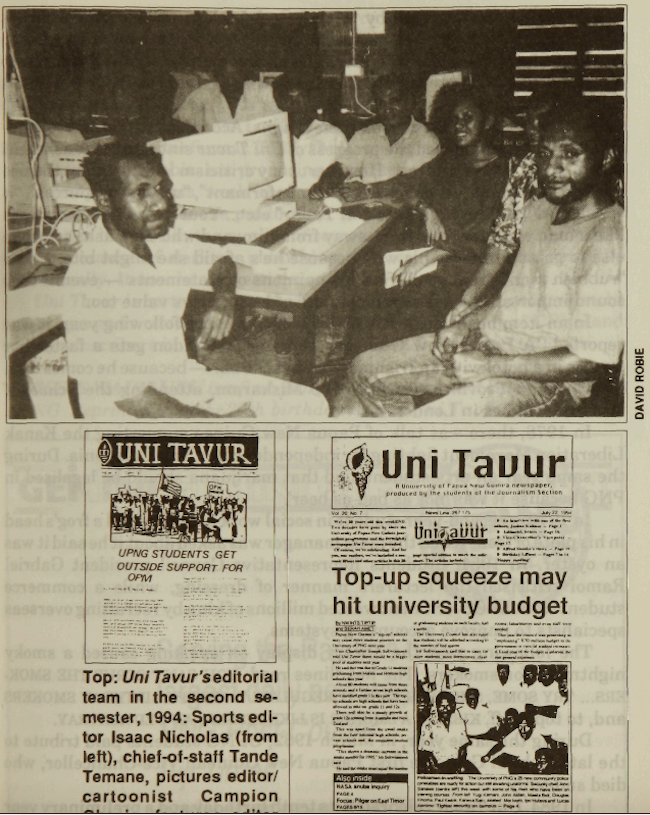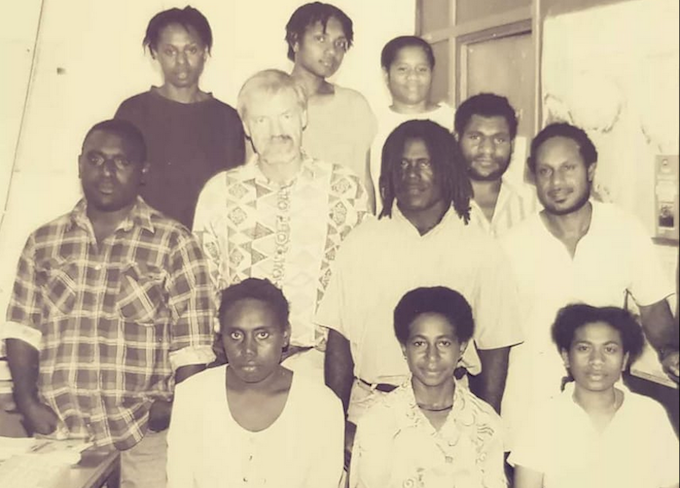Uni Tavur, the journalism training newspaper produced by the University of Papua New Guinea reporters and editors, celebrated its second decade of publishing in July 1994. The newspaper marked the occasion with a 20-page souvenir issue and made a television documentary.
By Jessie Waibauru in Port Moresby
It has been 20 good years since Uni Tavur was first launched. Today the journalism students are proud to be celebrating the newspaper’s twentieth birthday.

Uni Tavur is the University of Papua New Guinea’s journalism training newspaper, produced by the journalism students doing practical reporting and print production. The students cover stories about life on campus, community news and national affairs.
The journalism course began originally in New Zealand in 1974 — the year before Independence. The first issue of Uni Tavur came out on 24 July 1975. But a mix-up over volume numbers means this is the twentieth year.
Tavur means “conch shell” in the Tolai language of the Gazelle Peninsula. The shell is the paper’s logo and the original version was designed by journalism student Robert Elowo, who died in a car accident in 1976 while working for NBC’s Radio Kundiawa. Uni is derived from the university.
The first edition of Uni Tavur carried news items, including social and sports events. It consisted of four pages and had a circulation of 200 copies.
The university took over from the New Zealand government in funding and running the course in 1978. A two-year Diploma in Media Studies course started in 1985, replacing the one-year diploma course which had run for 10 years. The Bachelor of Journalism degree course started a year later.
Uni Tavur has seen a lot of changes through the years. The student reporters assigned to rounds had to cover anything of news value for their readers. Whether it was life on campus, life on the borderline, the political scene or anything of national interest, the students sweated to get the paper going.

Twenty years have gone by. We now look back at some of the hundreds of journalism students who have written for Uni Tavur over the years.
In 1975, the reports were on Sir Michael Somare leading the country into independence on September l6 and the voting of the first PNG Governor-General into office.
Letters to the editor caused some laughs. According to one correspondent in 1975: “I’ve followed the progress of Uni Tavur since its establishment with a great deal of interest. However … my criticism is directed at the use of phrases such as ‘other sources’, ‘one informant’, ‘unknown sources’, ‘it is believed’, ‘a source close to Uni Tavur‘ etc …
“Your anonymous source is like a man whose wife has run away from him, and who then asks someone else to go and beat up his wife because he’s afraid she might bite. He’s a ‘rubbish man’, and you’ll find his opinions or statements — even if they sound important — are worthless, and of lesser news value too.'”
In an item headlined NEW IRISH WANTOKS the following year, it was reported: ‘A Papua New Guinean studying in London gets a faster bar service in a hotel with an Irishman behind the bar — because he comes from New Ireland Province. He is Norlie Miskaram, attending the School of Oriental Studies in London.’
In 1978, there was talk of Papua New Guinea supporting the Kanak Liberation Movement fighting for independence for New Caledonia. During the same year an arts student said that marijuana should be legalised in PNG because it was “not as bad as beer”.
In 1979, a second-year student in social work said he found a frog’s head in his plate of food. When the mess manager was asked about it, he said it was “an oyster”.
In 1981, Students Representative Council president Gabriel Ramoi criticised the lecturers’ manner of dressing, while a commerce student said the government wasted millions of kina by recruiting overseas specialists to improve accounting systems.
The following year the library display on smoking caused a smoky nightmare for smokers. The headlines read: YOU CANT SCRUB THE SMOKERS . . . TRY SOME, SMOKERS TAKE IT REGULARLY . . . HAPPY BIRTHDAY SMOKERS and, to top it off, KISSING A SMOKER IS LIKE KISSING AN OLD ASHTRAY.
During the same year, in March 1982, UPNG students paid tribute to the late Gabriel Gris, the first Papua New Guinean Vice-Chancellor, who died suddenly.
In 1984, Uni Tavur celebrated its tenth birthday and a preliminary year student from North Solomons was in darkness after losing his spectacles up the mango tree next to the bookshop.
In 1985, Uni Tavur celebrated Papua New Guinea’s Independence anniversary by reporting the changes on campus and around the city over the previous decade.
Two years later, 50 university staff were retrenched at the end of the year when the government imposed a five percent budget cut, and a security guard was removed from the mess after giving away fruit to the students.
In 1989, there were reports of the university’s original bush material chapel built in 1971 — and it was burnt down the same year. The new chapel opened in 1989.
The same year, during rehearsal of a play, The Ungrateful Daughter, one of the students, instead of saying, “Darling, your steak is delicious,” said, “Darling, your stick is delicious.”
Now we are in the 1990s.
Looking back over the years the newspaper used to be more of a newsletter format.
Today the journalism students, with the help of lecturer David Robie, are producing a professional newspaper.
Twenty years this week sees a different Uni Tavur with modern equipment to facilitate the production. The newspaper has improved not only in size but also in the quality of news reports.
There has been a significant change because of desktop publishing. The content has also changed dramatically. It now has advertisements.
Uni Tavur is certainly a newspaper in its own right. It has between 12 to 20 pages and a circulation of 1700.
It has a wide readership at UPNG and among subscribers in Papua New Guinea — and from Japan to Tahiti.
Jessie Waibauru is a first-year journalism student at the University of Papua New Guinea. Republished from the 20th birthday issue of Uni Tavur, 22 July 1994 via Pacific Journalism Review.
READ MORE:
- A frog’s head, old ashtrays and student politics
By Jessie Waibauru (Uni Tavur, 1994)
DOI: https://doi.org/10.24135/pjr.v1i1.523 - Uni Tavur: the evolution of a student press
By David Robie (Australian Journalism Review, 1995)
DOI: doi/abs/10.3316/ielapa.980100573 - Mekim Nius: South Pacific Media, Politics and Education
Dr David Robie’s history of the UPNG, USP and Divine Word journalism schools
(University of the South Pacific Books, 2004 – open access ebook)


